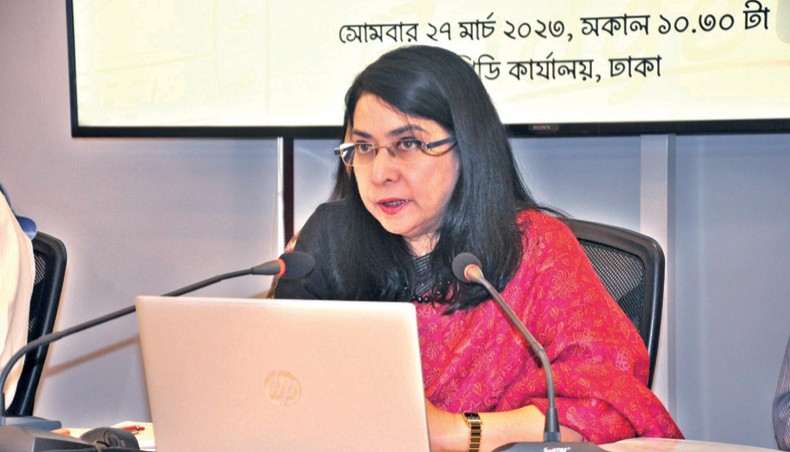
The Centre for Policy Dialogue on Monday proposed that the government should give priority to controlling inflation and raising revenue mobilisation in formulating the national budget for the forthcoming financial year 2023-2024.
At a briefing on the CPD’s recommendations for the national budget FY2023-24 at its office in the capital Dhaka, CPD executive director Fahmida Khatun said, ‘The budget for FY2024 should take cognisance of the emerging realities adequately, assess the available policy options diligently and formulate the measures accordingly.’
At the same time, demand for budgetary allocations towards various sectors should be increased, she said.
Fahmida said that the price inflation of daily essential food products had increased by more than 25 per cent.
In this context, the CPD recommends giving a 5-per cent increment in the wages of workers in various industries, as well as forming a new wage structure, she said.
A ‘special increment’ should be given to all officers and employees in public and private sectors to take some pressure off people with limited incomes amid the high inflation, she said.
The CPD in its budget proposals said that the government should carefully examine the duty and tax structures of the 18 essential commodities, both at import and domestic levels, and make downward adjustments with a view to providing some respite to low- and limited-income earning consumers.
The think tank also highlighted several disquieting developments, including negative growth in revenue mobilisation, slow implementation of the development projects, increased reliance on bank borrowing for deficit financing, skyrocketing prices of essentials, declining liquidity situation of banks, deteriorating external sector balance, and the state foreign exchange reserves.
‘Given the current macroeconomic situation, policymakers’ scope of manoeuvring policy measures has become rather limited due to the declining fiscal space,’ the CPD said in its analysis.
The CPD also proposed a reform in the individual income tax slab structure, reducing the highest tax rate from 30 per cent to 25 per cent and raising the tax-free income threshold for personal income to Tk 3.50 lakh and also offering the investment tax rebate facility for the marginal investors on investment of below Tk 15 lakh.
‘We propose that the rate of investment tax rebate which was set at 15 per cent on the eligible amount might be reformed to avail the facility for the marginal investors,’ said Fahmida.
‘We also propose withdrawing the existing provision for special tax treatment in respect of undisclosed offshore assets, saying that such provision has create discrimination in the country’s tax system,’ she said.
The think tank suggested offering exemption of value-added tax on tuition fees of English medium schools and reducing duties on import of foreign printed books, saying that education is not luxury goods.
The CPD also suggested that the National Board of Revenue should raise corporate tax on companies manufacturing tobacco products, such as cigarette, bidi, chewing tobacco, jarda and gul and imposing 100 per cent excise duty and 15 per cent value-added tax on carbonated soft drinks and energy drinks instead of the existing 25 to 35 per cent supplementary duty, saying that tobacco products and carbonated drinks are significant health concerns for the country.
It also proposed reducing and withdrawing import duties on menstrual hygiene goods as such products are fundamental rights and need products for women and girls.
It also suggested simplifying the VAT return system by promoting integrated digital connectivity.
Good governance and discipline are essential for these policies to bring forth their intended results, it observed.
The think tank also said that while the current scenario might be disincentivising for a political government in an election year, proper acknowledgement of the current situation should be at the forefront while formulating the budget for the next financial year.
